 MyDogBreeds
MyDogBreedsYo-Chon is originated from United States but Pugnaces Britanniae is originated from United Kingdom. Yo-Chon may grow 45 cm / 17 inches shorter than Pugnaces Britanniae. Yo-Chon may weigh 106 kg / 233 pounds lesser than Pugnaces Britanniae. Both Yo-Chon and Pugnaces Britanniae has almost same life span. Yo-Chon may have less litter size than Pugnaces Britanniae. Yo-Chon requires Moderate maintenance. But Pugnaces Britanniae requires Low maintenance
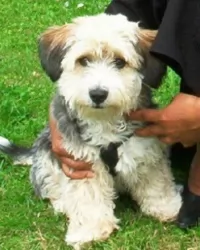 The Yorkie Bichon or Yo-Chon as he is fondly referred to as a designer crossbreed hailing from the United States.
The Yorkie Bichon or Yo-Chon as he is fondly referred to as a designer crossbreed hailing from the United States.
Information isn’t readily available on the origins of this cute little dog, but the dog is believed to be a cross between a Bichon Frise and Yorkshire Terrier.
It is thought that the dog was developed in the United States from about 1998 to 2001. As a hybrid, the Yorkie Bichon isn’t recognized by the American Kennel Club.
Pugnaces Britanniae is a dog which is now extinct. There isn't certainty surrounding the origins of the dog but it is thought they descended from dogs brought to Britain way back in the 6th century BC already.
These are ancient dogs, and when you do research you find references dating back to centuries ago. In fact when you read of the Roman conquest of Britain you read of huge dogs, which the Romans referred to as Pugnaces Britanniae.
It is believed that the English Mastiff descended from the ancient Alaunt and Pugnaces Britanniae and that the dog was used as a war dog.
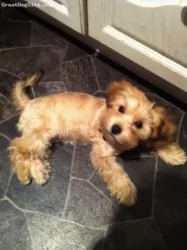 The Yo-Chon stands between 25 and 30cm and weighs in the region of 2 to 4kg. He can be like a teddy-bear this little dog and the coat can be either silky and straight or wavy. It is medium length and some people have the coat professionally trimmed.
The Yo-Chon stands between 25 and 30cm and weighs in the region of 2 to 4kg. He can be like a teddy-bear this little dog and the coat can be either silky and straight or wavy. It is medium length and some people have the coat professionally trimmed.
The low shedding coat comes in a variety of colors – cream, grey, tan, white, black or bi-colored.
Your Yorkie Bichon will no doubt have some habits that come from both parent breeds. Your dog is likely to be independent, social, friendly, social and loving, wanting to spend lots of time with you.
They’re small but they make good watchdogs with their high-pitch bark. Your Yo-Chon is an intelligent little dog too and by having him trained and socialized he is well behaved and pleasant to have around. You can tell him to lie down, sit or stay which is useful when you have visitors.
He gets on well with children, but the puppies particularly are tiny and fragile and they can easily get hurt by untrained and undisciplined children.
The Pugnaces Britanniae was a huge dog standing at roughly 67 to 75cm and weighing 52 to 110kg.
He was a heavily built dog, a Mastiff type dog that had a large head, broad muzzle with fairly loose skin around the mouth, brown eyes, a broad back and rump, muscular legs and floppy ears with a long tail. In fact the Mastiff, thought to have descended from the ancient Alaunt and Pugnaces Britanniae, gives you an idea of what the dog looked like. He no doubt has a short, smooth coat available in fawn, tan or brindle and with the black mask.
The Pugnaces Britannia was a naturally aggressive dog so it is to be expected that he wouldn’t automatically have been a good family dog, possibly being aggressive around children and other dogs. They were intelligent and were no doubt taught some simple commands.
They were also very territorial dogs, wanting to instinctively chase and attack unknown people and animals. They were strong minded, confident, loyal ad loving dogs towards their owners, being protective of them, wanting to please them.
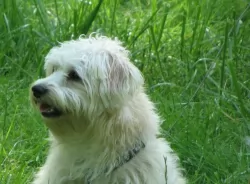 The Yo-Chon is an independent, happy dog who loves nothing more than to be surrounded by all his favorite human beings.
The Yo-Chon is an independent, happy dog who loves nothing more than to be surrounded by all his favorite human beings.
They are loving, loyal and gentle dogs and are good playmates for children who have been taught how to handle them with care and kindness.
He is smart and has an amicable nature and will take kindly to being trained and socialized.
With the Yo-Chon in your life, you can be sure you’re going to benefit from having a splendid family pet and companion.
The Pugnaces Britanniae may well have been a large dog and quite imposing to look at but he was in all likelihood a good-natured pet who got on well with his family members, being loyal and loving if brought up correctly.
Long ago dog training and socialization didn’t exist but a large dog like this would have to be socialized and trained to become obedient and an amicable all-rounder.
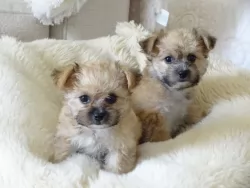 Both the Yorkie and Bichon Frise are dog breeds that are prone to Legg-Calvé-Perthes disease. This is when there is insufficient blood supply to the hind thigh bone, so the dog becomes lame.
Both the Yorkie and Bichon Frise are dog breeds that are prone to Legg-Calvé-Perthes disease. This is when there is insufficient blood supply to the hind thigh bone, so the dog becomes lame.
Surgical correction is necessary. Like small dogs in general, the Yochon might have dental issues. Slipped kneecaps, hypothyroidism and eye problems might affect the Yochon as well.
The Pugnaces Britanniae could live to 10, 11 or 12 years of age with good care. Large Mastiff type dogs like this would have had to watch out for common canine diseases such as hip dysplasia, cancer and bloat.
In those days, no screening tests were available for health problems like this. Gastric dilatation volvulus or bloat is a common health issue with large, deep chested dogs where the stomach fills with gas and the stomach twists. Its a life threatening disease.
Canine heart disease is another serious health issue with these mastiff type dogs. Early stages with heart disease show there may well be no symptoms at all. However, as the heart disease progresses towards congestive heart failure, the dog will have symptoms such as fatigue, difficulty with breathing, weight loss, a distended abdomen and coughing.
A dog with symptoms like this would have to see a vet immediately.
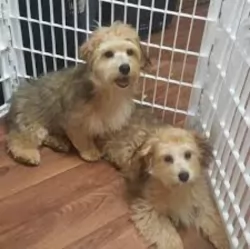 Everybody is busy and they don’t always have time to exercise their pets. As a human being, your health relies heavily on the exercise you get so you and your dog can exercise together.
Everybody is busy and they don’t always have time to exercise their pets. As a human being, your health relies heavily on the exercise you get so you and your dog can exercise together.
These days if you seriously don’t have time and you have money to spare, there are excellent doggy daycare centers where your dog can have fun playtimes with other dogs and people.
Dog exercises will change over time with age but at least try to get used to giving your pet a walk every day as this kind of exercise can extend into old age with both you and your pet.
Swimming, ball games, fetch games and walks or hikes are all great forms of exercise.
Good nutrition ensures your Yorkie Bichon has a good chance to be healthy and energetic. Some of the commercially manufactured dog foods you get are made with bad ingredients and they can make your dog sick.
The good quality ones can be nutritious for your dog and also wonderfully convenient. Always read the packaging labels so you know what your dog’s getting.
Cooked vegetables, boiled chicken and brown rice, nicely chopped up and added to the dry kibble can add variety to your pet’s diet while remaining deliciously nutritious and tasty as well.
Brush your Yo-Chon at least twice a week to keep the hair silky and shiny. Clip your dog’s nails when they get long.
Check inside his ears for signs of redness and the possibility of an infection. Try and look inside his mouth too for bad teeth as this can cause lots of health problems for your pet.
If you don’t have the time to do all these things, there are professional pet groomers who will do all these grooming chores for you.
The diets of ancient dogs were different to what they are today, as in those days there were no commercially manufactured dog foods. Dog owners in all likelihood tossed scraps to them which included starch.
Today a large dog such as the extinct Pugnaces Britannia would have no doubt been fed a high quality kibble from a leading brand and packed with minerals and vitamins specially formulated for a large dog breed.
Homemade food is also important, but not any kind of food – it has to be food which doesn’t upset the dog’s digestive system. Simple but nutritious food such as boiled chicken, brown rice or pasta, sweet potatoes, carrots and spinach is ideal for a dog, and when it is chopped up can be added twice a week to the dry kibble for a tasty, healthy treat.
Raw meat added in occasionally is also hugely beneficial. No dog should ever be without fresh, cool water constantly available.
As a short haired dog, the Pugnaces Britanniae would have required a brushing twice a week to rid the dog of loose hairs. Maybe in those days they didn’t check their dogs over to see that all was well, but today you would need to check the inside of the ears. If the insides were red, it could be a sign of an ear infection brought on by dampness, excess wax and dirt.
The eyes would need to be checked for discharge and the teeth checked a well. One rotten tooth can cause a lot of havoc. The nails of the dog would have had to be checked and clipped as well.
As a war dog, the Pugnaces Britanniae would have been fit. He is a big dog and while they require exercise such as walks and hide-and-seek type of games, he isn’t the kind of dog that would go running with you on a jog, as large, heavy dogs can overheat easily.